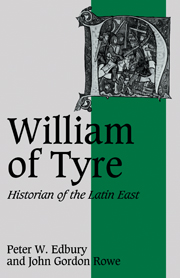Book contents
- Frontmatter
- Contents
- Preface
- Abbreviations and forms of reference
- Introduction
- PART I WILLIAM OF TYRE AND THE WRITING OF THE ‘HISTORIA’
- PART II WILLIAM OF TYRE AND THE MEANING OF THE ‘HISTORIA’
- 5 The monarchy
- 6 Regnum and ecclesia
- 7 The papacy
- 8 The Byzantine empire
- 9 The war against the infidel
- Conclusion
- Bibliography
- Index
- Cambridge studies in medieval life and thought
7 - The papacy
Published online by Cambridge University Press: 09 October 2009
- Frontmatter
- Contents
- Preface
- Abbreviations and forms of reference
- Introduction
- PART I WILLIAM OF TYRE AND THE WRITING OF THE ‘HISTORIA’
- PART II WILLIAM OF TYRE AND THE MEANING OF THE ‘HISTORIA’
- 5 The monarchy
- 6 Regnum and ecclesia
- 7 The papacy
- 8 The Byzantine empire
- 9 The war against the infidel
- Conclusion
- Bibliography
- Index
- Cambridge studies in medieval life and thought
Summary
There is never any question that William of Tyre accepted the papacy's own claims to apostolic authority within Christendom. His respect for the importance of papal office is immediately apparent from his condemnation of Guibert of Ravenna, the anti-pope installed by Henry IV in 1080, and by his comments on the threat to Christian Europe caused by the schism of 1130. He noted with approval how the schism which had originated in 1080 was settled in the early 1120s, how the irregular election of Pope Honorius II in 1124 was rectified, and how the 1159 schism was eventually brought to an end in 1177. He was also at pains to emphasize the role of Urban II in launching the First Crusade, and of Eugenius III in launching the Second. Both popes were spoken of warmly. William stressed Urban's God-given eloquence, and Eugenius too was a ‘godly man’. On the other hand, in recording the election of Pope Lucius III in 1181, William remarked that the new pope was ‘somewhat elderly and not very (“modice”) learned’. It is a dismissive description which might easily be passed over were it not for the fact that Lucius was still pope at the time of writing. Of his predecessor, Pope Alexander III, whose long pontificate (1159–81) spanned almost the whole of William's public career, he was equally dismissive. Scattered through the pages of the Historia are a mere handful of references to him, and William avoided making any comment at all on either his personality or his achievements.
- Type
- Chapter
- Information
- William of TyreHistorian of the Latin East, pp. 109 - 129Publisher: Cambridge University PressPrint publication year: 1988



